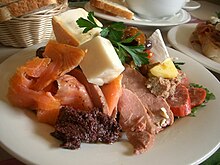| This article needs additional citations for verification. Please help improve this article by adding citations to reliable sources. Unsourced material may be challenged and removed. Find sources: "Antipasto" – news · newspapers · books · scholar · JSTOR (March 2024) (Learn how and when to remove this message) |
 Antipasti served in a restaurant Antipasti served in a restaurant | |
| Place of origin | Italy |
|---|---|
| Main ingredients | Any of cured meats, olives, peperoncini, mushrooms, anchovies, artichoke hearts, cheese, pickled meats and vegetables (in oil or vinegar) |
| Variations | Seafood platter; calamari, mussels, smoked salmon, tuna fish, olives |

Antipasto (pl.: antipasti) is the traditional first course of a formal Italian meal. Usually made of bite-size small portions and presented on a platter from which everyone serves themselves, the purpose of antipasti is to stimulate the appetite. Typical ingredients of a traditional antipasto includes cured meats, olives, peperoncini, mushrooms, anchovies, artichoke hearts, various cheeses (such as provolone or mozzarella), pickled meats, and vegetables in oil or vinegar.
The contents of an antipasto vary greatly according to regional cuisine. Different preparations of saltwater fish and traditional southern cured meats (like soppressata or 'nduja) are popular in the south of Italy, whereas in northern Italy it is common to serve different kinds of cured meats and mushrooms and, especially near lakes, preparations of freshwater fish. The cheeses included also vary significantly between regions and backgrounds, and include hard and soft cheeses.
See also
- List of hors d'oeuvre
- List of ancient dishes and foods
- List of Italian dishes
- Italian meal structure
- Cured meat
References
- "Definition of ANTIPASTO". www.merriam-webster.com.
- What is Antipasto?
Further reading
- Scicolone, Michele (1998). The Antipasto Table. HarperCollins. ISBN 9780880016278. Retrieved April 20, 2012.